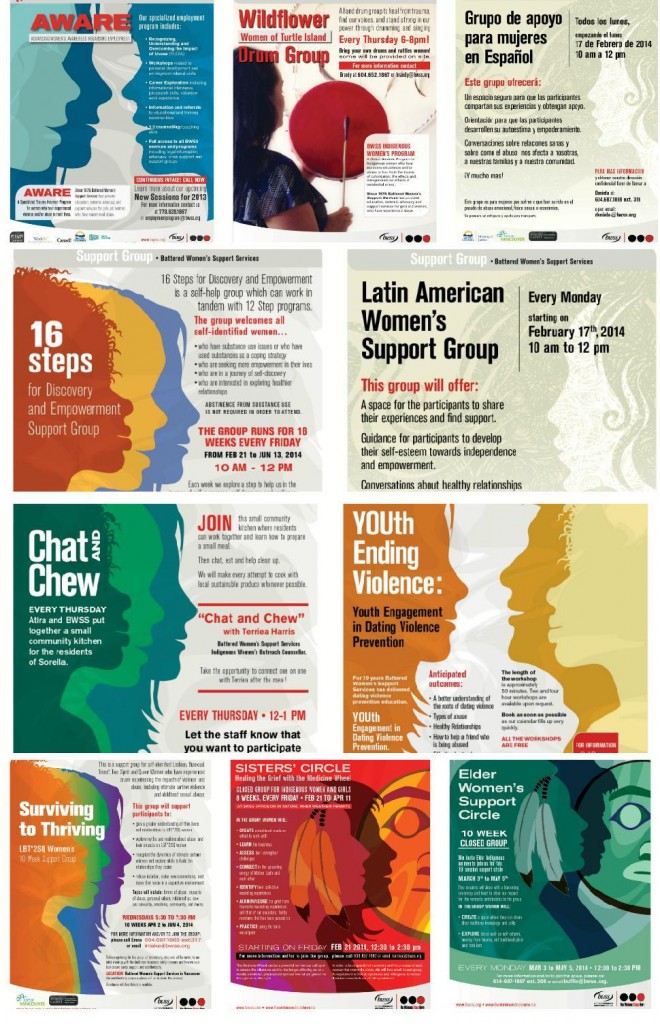by Rosa Elena Arteaga, BWSS Manager of Direct Services and Clinical Practice
At Battered Women Support Services (BWSS), we have been providing specialized support groups to girls and women who experienced gendered violence for the last thirty five years. Over 3,720 girls and women access our specialized support groups every year. We are particularly motivated to create new alternatives for the delivery of specialized support groups that address the complex needs of girls and women who have experienced multiple traumas. In order to support girls and women to break the silence, we have created a safe non-judgmental structure where girls and women find a voice, break isolation and ultimately heal. All our support groups are co-facilitated by trained members of BWSS team. Modelling equality through co-facilitation helps demonstrate how power can be shared.Modelling equality and sharing power is a transformational process that runs contrary to the power and control women experience in their abusive relationships. We are firm believers on the power of support groups and structures designed to provide emotional support, to provide education, to challenge systemic oppression, to address injustices, and at last affect individual and social change.
Over the years, through applying knowledge, we have developed specialized curricula for support groups to address the diverse cultural needs, the different forms of gendered violence that girls and women experience as well as to address the multiple trauma that women experience as a result of gendered violence, one of them being sexual violence. Of the women who attend our support groups, 80% report experiencing sexual violence either historically in the form of incest, as youth through date rape or within their abusive adult relationships. We have integrated different interventions and therapeutic practices in order to create a therapeutic structure that can be enriching and transformative.
For many survivors of sexual violence there is a strong feeling of injustice which can at times be overwhelming and can hinder healing[1].” The majority of girls and women who experienced gendered violence and who seek our support have endured numerous victim-blaming messages. These instances of victim blaming frequently morph into shame, guilt, self-blame, and —ultimately— secrecy. We have found that one of the main barriers for women survivors of sexual violence is “to defeat secrecy and speak out[2]”. In our experience, when women speak out they usually begin by sharing their story with a friend or a family member. More often than not, these people encourage the girl or woman to maintain her story “secret”. Once that a girl or woman is able to reach out for support she has already navigated a social structure that has shot her down, with all likelihood, more than once. Through our specialized groups for women survivors of sexual abuse we invite girls and women to explore what are the messages that people send about women and girls who have been sexually abused and how these ideas affect them. We invite the group participants to have conversations through a verbal and non-verbal process such as art therapy.
In our work we are eager to integrate trauma theory, body work, art therapy, narrative therapy among other approaches. Our multiple approaches are designed to provide the space for girls and women to stand in their own power and to enter in their individual transformative journey.
At BWSS we are certain of the effectiveness evidenced through the different ways in which we are working with girls and women survivors who seek healing and justice. It remains true that women sharing their stories in the safe structured setting of a support group is a powerful way of breaking the silence and transforming women’s stories of injustice into skills and knowledge that not only contribute to the transformation of the women themselves but also to the transformation of ourselves as therapists, counsellors, support workers and volunteers and the larger society as women apply their new found or reclaimed skills into their lives with their children, families, co-workers and beyond. In our work as group facilitators we facilitate the re-telling of women’s stories by knitting them together and finding common themes that grow organically into a web of skill, knowledge, and expertise. This expertise has contributed to the transformation of individual lives, families and communities.
References
[1] Hung Suet-Lin and Denborough 2013, p.19
[2] Hung Suet Lin, S & Denborough, D. (2013), Unearthing new concepts of justice: women sexual violence survivors seeking healing and justice. International Journal of Narrative Therapy and Community Work 2013, #3
Read more about our 16 Days of Activism Against Gender-based Violence campaign:
International Day to End Violence Against Women in Canada
Women’s Leadership for One Future Without Violence
The Dynamics of Power and Control After Separation in Relation to the Family Law Processes
16 Steps for Discovery and Empowerment
Decolonizing and Healing Through Ceremonies
If you could do something to end violence against girls and women, wouldn’t you?






